Want to learn about Alzheimer’s disease and help fight it? Be a Beta Catcher!
UC Davis leads a $6 million NIH grant to better understand Alzheimer’s in Hispanic people
There is almost always a personal story, a quest, driving researchers. For UC Davis neuropathology expert Brittany Dugger, it was witnessing how dementia affected her two grandmothers in very different ways.
That experience shaped her career choices and put her on a mission to understand dementia and its related diseases — particularly in people with Hispanic heritage. Now, she and a team of researchers have received a $6 million grant from the National Institutes of Health (NIH) to address how Alzheimer’s may affect people differently, especially those who identify as Hispanic.
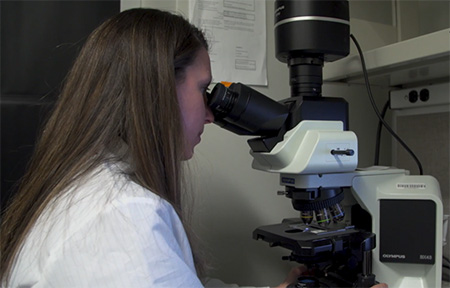
“My grandmothers had dementia at the same time, but their diseases were very different. I remember being really frustrated. How do they have the same diagnosis when they are behaving completely differently? I wanted to know,” Dugger said.
Dugger is now an associate professor in the Department of Pathology and Laboratory Medicine. She leads the Neuropathology Core at the UC Davis Alzheimer’s Disease Center
In 2019, she led a $3.8 million 5-year grant from the National Institute for Aging (NIA). The grant funded the first large-scale initiative to describe brain manifestations of Alzheimer’s disease in people of Mexican, Cuban, Puerto Rican and Dominican descent.
The new grant involves researchers from many fields and institutions. It will address how Hispanic heritage relates to pathologic, demographic and clinical manifestations of Alzheimer’s.
The grant integrates machine learning, citizen science, and precision medicine in Alzheimer’s disease, especially within the Hispanic and Latino communities.
Engaging people with Alzheimer’s through gaming
In a small pilot study, Dugger and the team created and tested a game called Beta Catchers. It is in partnership with the Human Computation Institute, which creates online platforms that allow public volunteers to analyze scientific data in a game-like environment.
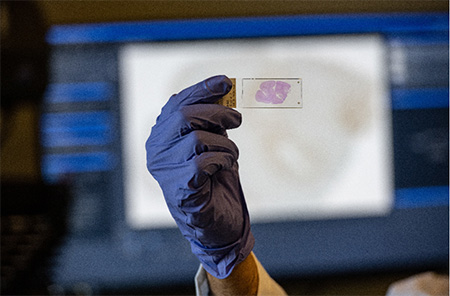
“We have over 80,000 registered users from 200 countries. Users come together to analyze scientific data. This speeds up research,” said Pietro Michelucci, executive director of the Human Computation Institute.
Beta Catchers is focused on engaging people who identify as Hispanic or Latino. Players look at images of stained human brain tissues to identify and trace the pathologies found in brains of people with Alzheimer’s disease — such as amyloid plaques and neurofibrillary tangles.
“We can't rely on a single nonexpert member of the public to analyze. To come up with a very high quality, expert-like answer, we combine answers from many people seeing the same thing,” Michelucci explained.
The team developed an algorithm that uses the crowd’s wisdom to produce very high quality answers. With the new grant, they will further refine this algorithm.

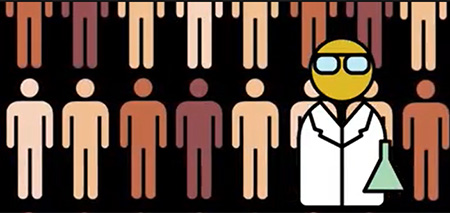
“How do we make sense out of players’ different answers? That is the fun part of the work, where we answer the research question through the field of human computation. We discovered the powerful wisdom of ‘crowd effect’ for the more difficult task, which is the classification of these toxic plaques,” Michelucci said.
The researchers would like people with Alzheimer’s as well as their family members to take part in the game. The new platform will be released summer 2025 in English and Spanish.
Besides growing the dataset for dementia pathologies, the game also provides outreach and educational opportunities.
“Children can play with their parents and their grandparents. How cool would that be? Could it inspire kids to become scientists? Engaging the public in scientific research can benefit science and also be an educational awareness moment,” Dugger said.
Disease evaluation for precision medicine
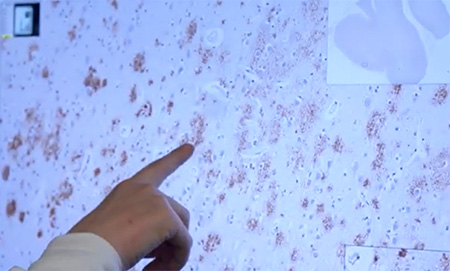
Another arm of Dugger’s new grant will continue to address the evaluation of Alzheimer’s disease. Dugger will examine the way scientists evaluate its pathologies and the implications of that on clinical practice.
“How we evaluate diseases affects our understanding of the pathology and the treatments. Is it binary with present or absent options, or is it a non, mild, moderate and severe gradation? How we assess affects diagnosis,” Dugger said.
She gave the example of cancer. Instead of limiting diagnosis to cancer, there is an assessment of cancer severity and grade level. For now, these deeper classifications are mostly absent in the dementia realm. Deeper phenotyping or grouping of the disease can promote precision medicine.
Precision medicine research looks at the role social and demographic factors play in health. It addresses how diseases, in this case neuropathology, exhibit themselves similarly or differently among people. The aim is to reduce disease disparities and advance medicine for all by giving the right treatment to the right patient at the right time.

“Our research will fill critical knowledge gaps on Alzheimer’s by providing objective quantitative understanding of differences in the disease,” Dugger said. “We will engage the community to examine the neuropathologic landscape of Alzheimer’s, leading to better precision medicine approaches, especially for people within the Hispanic community.”
For this work, Dugger is collaborating with Chen-Nee Chuah, a UC Davis professor of electrical and computer engineering. Chuah is an expert in data science, artificial intelligence (AI) and machine learning (ML). She will build on her work with a UC-wide initiative, known as UC Noyce Initiative, to develop computer models that promote precision medicine.
“In this project, we will attempt to address bias in AI/ML models. One way to do that is by leveraging brain tissue images from diverse cohorts,” Chuah said.
Through a separate grant, the team will build the infrastructure to share pathology images across the country. The objective is to create a digital slide archive, like a searchable dictionary.
For more inclusive research on dementia
In their original grant, Dugger and a team of researchers asked: Does dementia vary in people from different backgrounds?
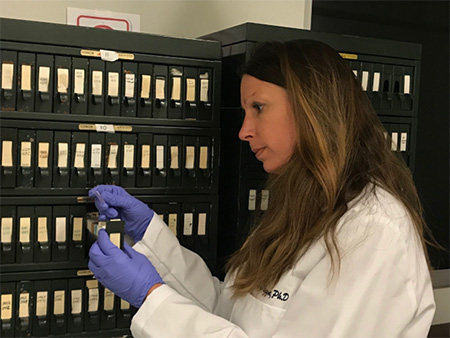
“Most works on dementia have been focused on persons of certain demographics,” Dugger said. “It is imperative to study persons from diverse backgrounds, including persons who identify as Hispanic, to develop cures that benefit everyone.”
The team studied brain tissue from UC Davis, UC San Diego and Columbia University’s national Alzheimer’s disease research centers. They looked at plaque location and amount linked to dementia in the brains of people with Alzheimer’s. This allowed for a micro examination of the brain.
“Instead of the 30,000-foot view, we tried to get a street-level view of the brain,” Dugger explained.
Their study has shown that there are many similarities among people with dementia, but those who identified as Hispanic had more cerebral vascular disease on top of their Alzheimer’s disease.
“I am very proud that UC Davis is designated a Hispanic Serving Institution. Our research aligns with this mission of serving Hispanic communities by contributing to their healthy aging,” Dugger said.

Partnerships and Collaborations
The grant involves researchers with very diverse expertise. In addition to Chuah and Michelucci, it includes associate professor David Gutman at Emory University and UC Davis professors:
- Lorena Garcia and Laurel Beckett in the Department of Public Health Sciences
- Dan Mungas in the Department of Neurology
- Luis Carvajal-Carmona in the Department of Biochemistry and Molecular Medicine.
Dugger is very grateful for her collaborators and the participants who take part in her research studies.
“We couldn't do this work without their data and samples. With the citizen science dimension, people can now help analyze data,” Dugger said.
Related readings and resources
- The neuropathological landscape of Hispanic and non-Hispanic White decedents with Alzheimer disease
- The neuropathological landscape of small vessel disease and Lewy pathology in a cohort of Hispanic and non-Hispanic White decedents with Alzheimer disease
- Artificial Intelligence Tool Developed for Alzheimer’s Research (video)
The UC Davis Alzheimer's Disease Center
The UC Davis Alzheimer's Disease Center is one of only 33 research centers designated by the National Institute on Aging. With locations in Sacramento and Walnut Creek, the center is focused on translating research findings into better tools to diagnose dementia and treatment for patients while focusing on the long-term goal of finding a way to prevent or cure Alzheimer's disease. Also funded by the state of California, the center allows researchers to study the effects of the disease on a uniquely diverse population. For more information, visit ucdavis.edu/alzheimers/.




